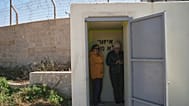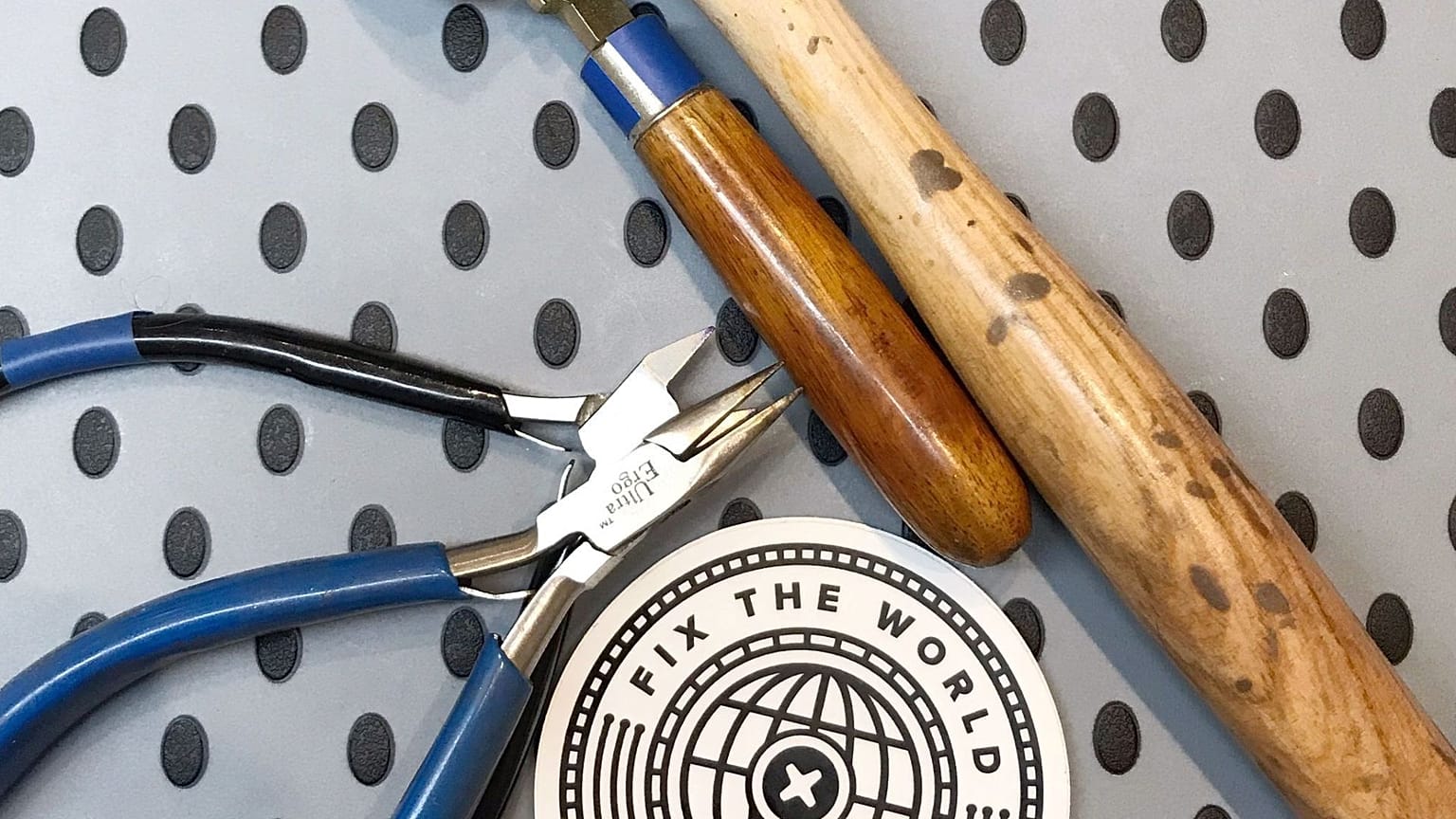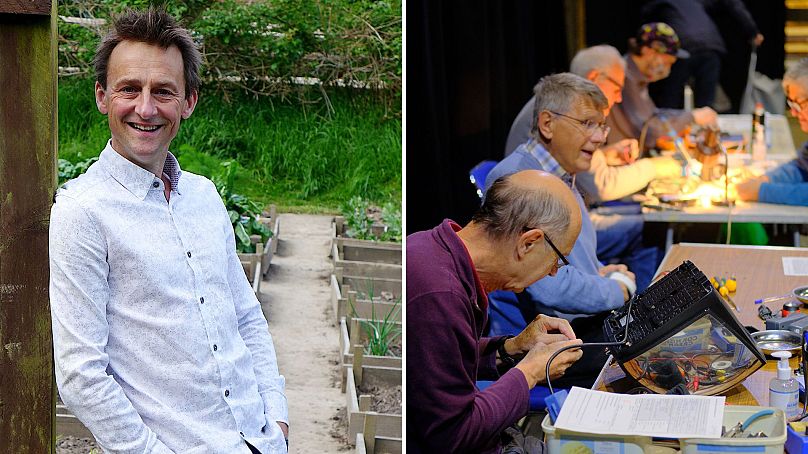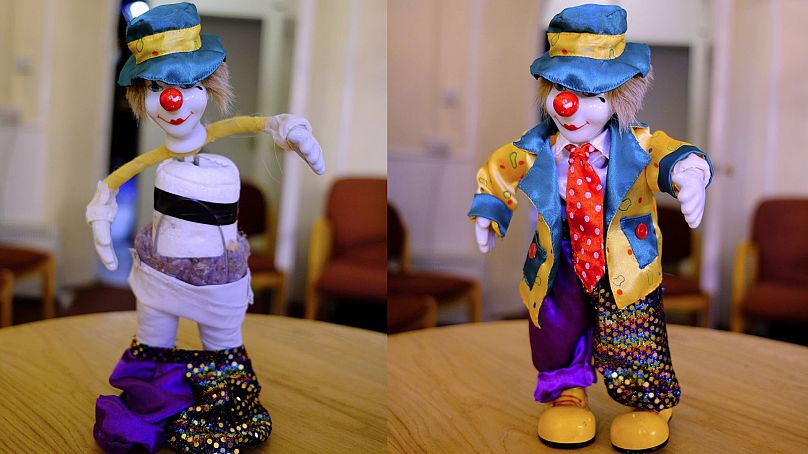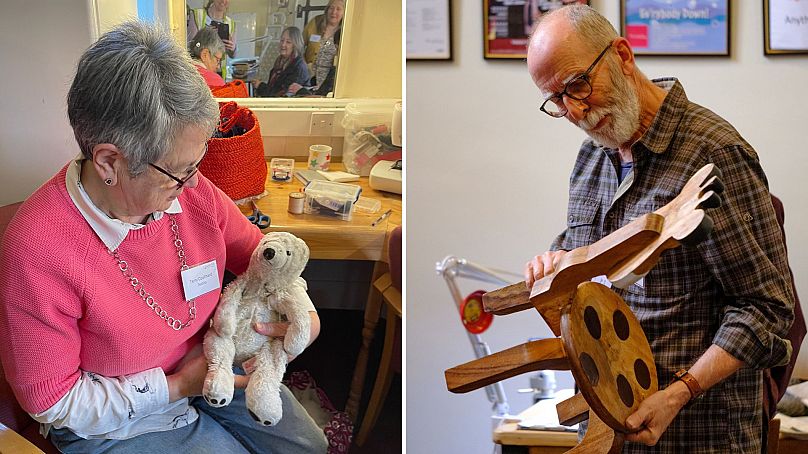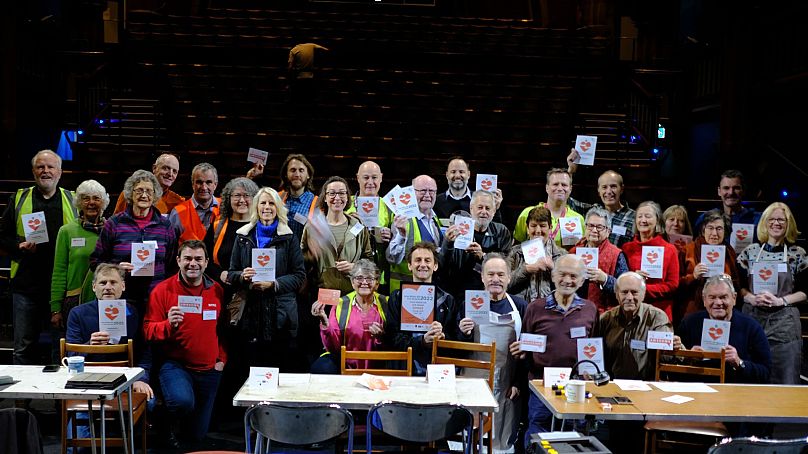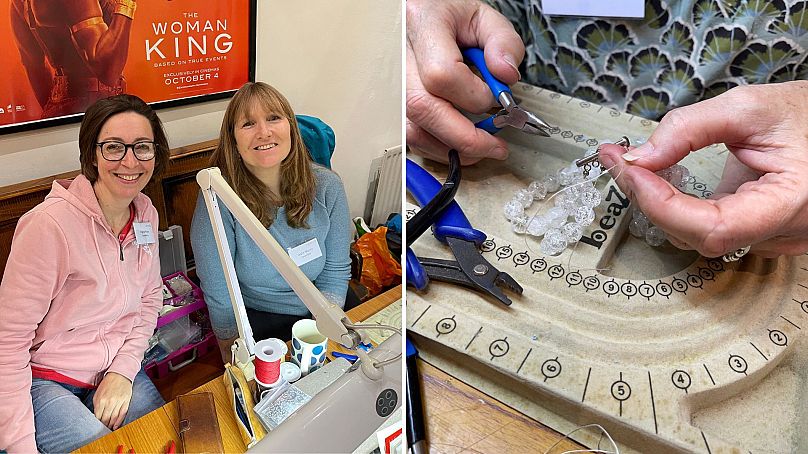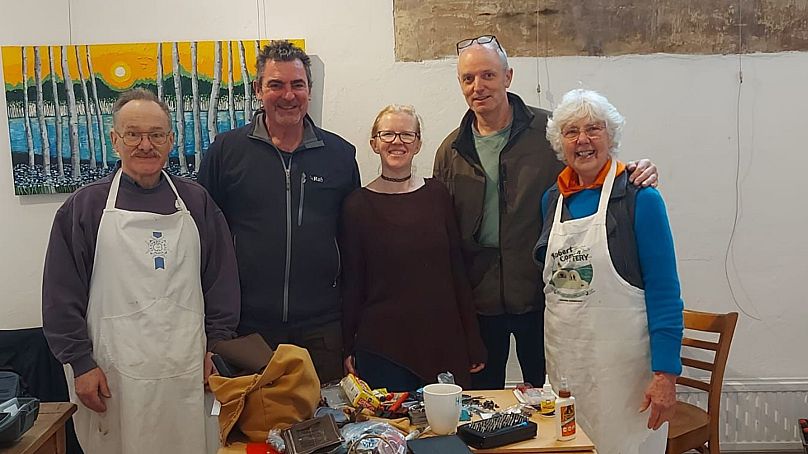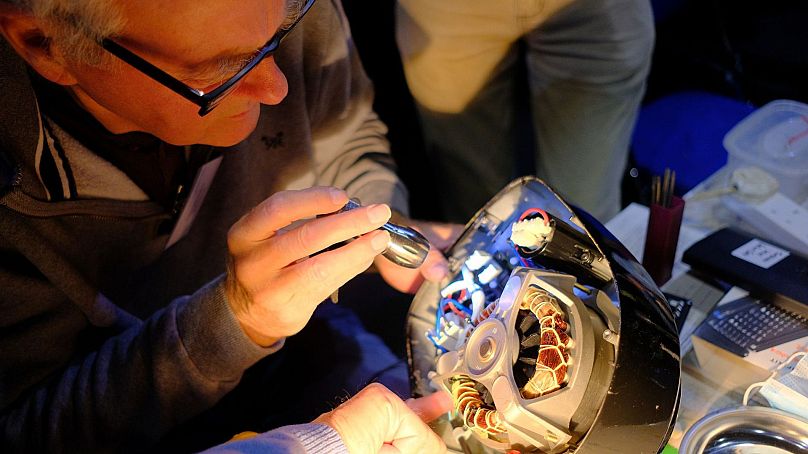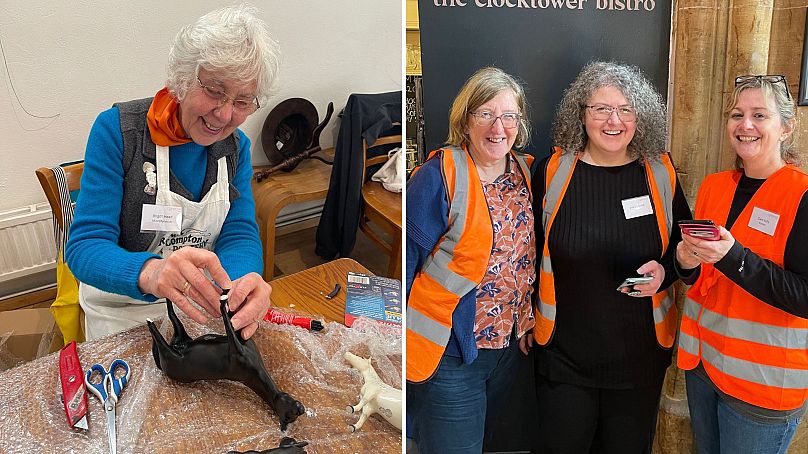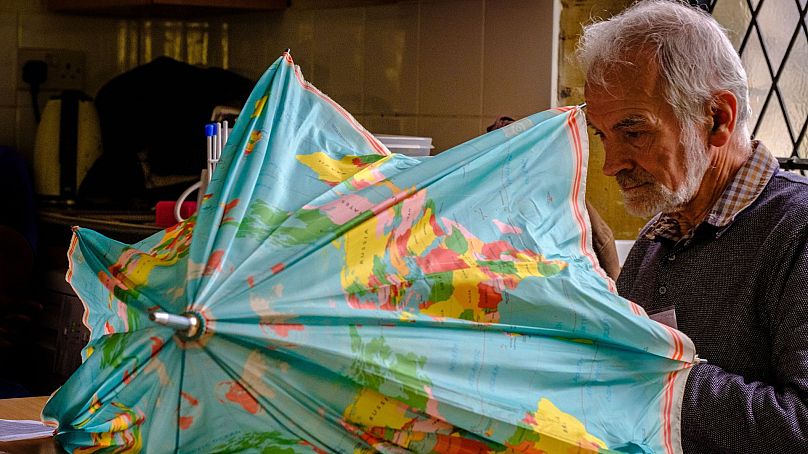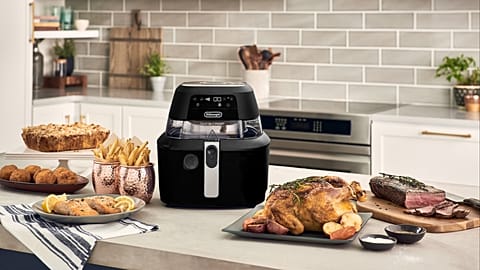How much does it cost to run a repair cafe? Here’s how to cut waste while raising money for charity.
“It’s abhorrent seeing things thrown away,” says Chris Murphy, the organiser of Tunbridge Wells Repair Cafe.
 ADVERTISEMENT
ADVERTISEMENT
 ADVERTISEMENT
ADVERTISEMENT
Chris is the type of person who goes to the dump and leaves with more things than he went with. He makes do and mends items when they’re broken. And he enjoys bringing people together.
So when he learnt about repair cafes from a friend back in 2019, his next step was a no-brainer.
“I thought well, we don’t have one, I'll start one,” the 51 year old from Tunbridge Wells, UK tells Euronews Green.
Just over three years later, he oversees one of the largest repair cafes in southeast England with 28 repair stations and 75 volunteers.
“There’s broken stuff over here, people who can mend stuff who have got a charity ethos. Bring them together - I love the idea of it,” Chris explains.
Here’s how it all came about.
What is a repair cafe?
Repair cafes are free, community-run meeting places where locals can bring broken items for volunteers to fix.
Frustrated with throwaway culture, Dutch environmentalist Martine Postma came up with the concept in Amsterdam in 2009.
Since then, it has blossomed into a global movement, with cafes in Belgium, Germany, France, the UK, the US and beyond.
How to start a repair cafe
Chris believes that anyone can start a repair cafe.
“There's no overarching, governing body or anything like that. They're all independent,” he says.
If you need a helping hand, however, Martine’s nonprofit Repair Cafe International offers a digital starter kit for a voluntary one-off fee of €49. Donations are used to promote the concept, provide online guidance on repairs and lobby for more goods to be repairable.
The kit includes a step-by-step manual for setting up a cafe, from finding expert volunteers and a suitable location, to collecting the right tools, creating publicity and finding funds. It also includes templates for promotional materials and registration and liability forms.
While Chris used this kit as a starting point, he and his army of volunteers have forged their own path over the years.
“In December 2021, we had the perfect storm… we had 150 people come through in a three-hour period and we had these paper forms,” says Chris. “It was just like a bunfight… we suddenly realised the whole system with paper forms is broken.”
This prompted a tech-savvy volunteer to use his programming skills to create an online system.
It allows visitors to pre-register, be allocated a repair station and see where they are in the queue. The system monitors how long each repair takes and volunteers input the outcome for data collection purposes. It also saves a whole lot of time.
“We don't have to manually input anything at the end - it was taking us hours to input data afterwards,” says Chris. “The admin is a lot less now.”
How much does it cost to run a repair cafe?
Repair cafes are volunteer-run and free to use. So how are they funded?
Tunbridge Wells Repair Cafe runs entirely on donations, Chris explains. Once visitors have had their items repaired, they are referred to the exit desk where volunteers gather feedback and donations by cash or card. On average, each visitor donates roughly £5 (€5.80).
The cafe runs for one day per month (except in August and December) and welcomes around 70 visitors each time, meaning each event generates around £350 (€406).
The money they raise far exceeds the running costs, which are around £43 (€50) per event. This covers refreshments for the volunteers and a £30 (€35) subscription fee for the online system.
“That’s a non-negotiable cost now, as opposed to having a pile of forms and handwriting you can’t read,” says Chris. Other cafes can also register to use this system by emailing matt@repairmanager.co.uk.
Chris estimates that the cafe spends an additional £600 (€696) per year on tools and equipment for repairs.
That amounts to an annual running cost of around £1,100 (€1,276), and annual donations of around £4,200 (€4,874). Any excess is donated to charity.
“We could apply for government funding, but we don’t really need it,” says Chris.
It could have been helpful at the start though: Chris fronted around £2,000 (€2,320) of his own money to get the project off the ground, which he has since recouped through donations.
He also cuts costs by storing all the equipment - five boxes of it - in his own home between events.
“People say, we could buy a load of spares. But that’s in my shed!
“The ideal would be that we had premises that we could lock things up and store there and then just wheel it out,” he adds.
What type of items can you take to a repair cafe?
Every repair cafe is different. At the one in Tunbridge Wells, there are repair stations covering electrical goods, mechanical goods, knife sharpening (including garden tools), IT, jewellery, clothing and textiles, and miscellaneous items.
“We've generally had a really good success rate, which is fantastic,” Chris reveals.
Some of the most common items brought to the electrical repair station include kettles, toasters, coffee makers, hairdryers, CD players, scooters, vacuum cleaners, hedge trimmers and lamps.
The mechanical repair station sees a lot of clocks, music boxes and mechanical toys.
“We get some old cuckoo clocks. People are delighted when they start working again - they just get very, very happy,” says Chris.
The IT station tends to deal with laptop screen replacements, software problems, and CD and DVD drives.
Visitors head to the jewellery station to fix broken clasps and restring beads. While the miscellaneous station takes on anything from broken ceramics to stuffed toys, chairs, suitcases and even umbrellas.
“It doesn’t always look pretty, like brand new, but who cares?”, Chris jokes.
So far, the cafe has seen over 1,000 repairs and raised thousands of pounds for charity.
How to find volunteers for your repair cafe
To kick things off, Chris put an article in the local newspaper. He also did shoutouts on Facebook and Nextdoor, a social media platform for neighbourhoods, available in the UK, the Netherlands and the USA.
“I had an amazing groundswell of people [who said] ‘Yeah, definitely put my name to that’,” he recalls.
100 locals attended his introductory meeting at Trinity Tunbridge Wells, a former church that now houses a community-minded theatre and arts hub - and the repair cafe - free of charge.
“They were asking lots of questions. Most of the answers were, ‘I have no idea, I’ve never run one of these before’,” Chris explains. He says he put his past experience running a training company to good use during the set-up phase.
75 people eventually signed up as volunteers and it takes around 40 to run the cafe at full capacity.
Who can volunteer at a repair cafe?
Anyone can volunteer at a repair cafe. It helps to have skills or an interest in a particular area of repairs - though some of these can be easily learned.
Those who are less handy can still form an essential part of the process.
Runners are the “eyes and ears of the repair station”, Chris says. They monitor queues and availability, showing people to their repair stations and introducing volunteers to visitors.
At Tunbridge Wells Repair Cafe, around 75 per cent of the volunteers are retirees. But the cafe also has volunteers in their 20s who “just have an interest and a passion”, he adds.
“They get to meet different people, make friends, and see things that they wouldn't normally get to repair. So it satisfies that curiosity and habit.”
For Chris, it’s this sense of community that makes it all worth it.
“I'm a firm believer that humanity flourishes in community,” he says. “It’s all about bringing people together as people.
“And, for me, the idea that in some way I have made the world a happier place, and hopefully a healthier place, and more sustainable - I sleep easier knowing I’m doing that.”
Tunbridge Wells Repair Cafe runs once a month (except in August and December) at Trinity Theatre, Church Road, Tunbridge Wells, UK. Check the Facebook and Instagram pages for dates.



